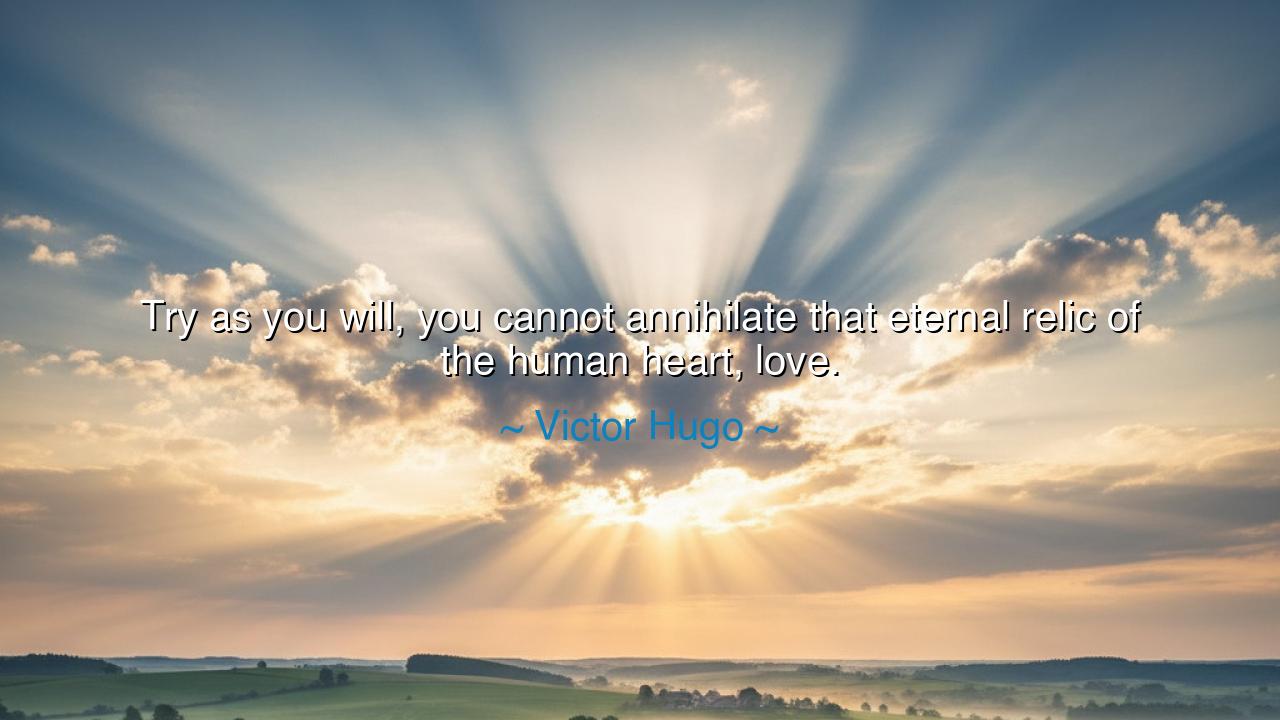
Try as you will, you cannot annihilate that eternal relic of the






“Try as you will, you cannot annihilate that eternal relic of the human heart — love,” wrote Victor Hugo, the immortal voice of compassion and revolution. In this single, thunderous sentence, he speaks not as a poet of romance, but as a prophet of the human spirit. Hugo reminds us that love, though wounded, exiled, or buried beneath centuries of cruelty, forever endures. Empires may fall, ideologies may change, and hatred may rise like a storm — but love, that eternal relic, remains unbroken, gleaming through the dust of every ruined age. For love is not merely an emotion; it is the sacred heartbeat of existence itself — the one force that no sword can cut, no tyrant can silence, and no darkness can destroy.
The origin of this quote lies in the heart of Hugo’s literary and moral universe. He was a man who had seen the grandeur and the ruin of human civilization — revolutions, wars, and exiles. He wrote of injustice with the fury of a prophet, but he always returned to love as the redemption of all suffering. In Les Misérables, The Hunchback of Notre Dame, and his many speeches and letters, Hugo proclaimed that love — whether between mother and child, between lovers, or between man and humanity — is the divine spark within mortal clay. When he speaks of it as an eternal relic, he means that even when the world forgets mercy and kindness, even when men harden their hearts in the name of power, something within still remembers — still reaches out for tenderness, for connection, for light.
To annihilate love would be to annihilate the soul of man. Yet throughout history, there have always been those who tried. The conqueror who rules through fear, the ideologue who preaches hate, the cynic who mocks compassion — all seek to crush that gentle flame. But as Hugo knew, the effort is futile. Love is not fragile; it is immortal. Like a river that carves through stone, it endures every attempt to dam or poison it. When oppression silences it in one generation, it reawakens in the next — in the laughter of children, in the tears of the compassionate, in the courage of those who still believe in goodness when the world has forgotten how.
Consider the story of Maximilian Kolbe, a Polish priest imprisoned in Auschwitz during the Second World War. When the Nazis condemned ten men to die by starvation, Kolbe stepped forward and offered his life in place of another — a father with a family. He went to his death praying and singing hymns. The machinery of hatred had sought to extinguish all human tenderness, and yet, in that moment, love triumphed over terror. This is what Hugo meant: though you may crush the body, you cannot destroy the spirit that loves. Love is the relic of eternity within mortal hearts, the indestructible evidence that humanity was made for something greater than violence or despair.
Hugo’s wisdom carries with it a moral challenge. To recognize that love cannot be destroyed is not enough; we must become its guardians. The modern world, like the ancient, is full of cynicism, where tenderness is mistaken for weakness and self-interest is called wisdom. Yet those who love — who dare to forgive, to hope, to give of themselves — are the true revolutionaries. For they keep alive what every tyrant fears most: the conscience of mankind. Love is not submission; it is resistance. It is the quiet refusal to hate, the courage to care even when others turn away.
And yet, Hugo’s “eternal relic” is not a distant ideal — it lives in the ordinary. It is in the mother who rises at dawn to feed her child, in the friend who stays when all others leave, in the stranger who shows mercy to another’s pain. These small acts are the pillars that uphold the human world. They are proof that the heart, no matter how battered, still beats in rhythm with the divine. For love does not die with disappointment or betrayal; it renews itself in each act of kindness, in every gesture of compassion that defies despair.
So, dear listener, what lesson can we draw from Victor Hugo’s immortal words? It is this: guard the relic of love within you. Do not let bitterness or fear corrode it. When the world grows cold, keep the flame alive — through patience, forgiveness, and courage. Love is not weakness; it is the power that keeps life sacred. When you choose love, you stand with every soul who has ever refused hatred, who has ever believed that gentleness is stronger than cruelty.
And remember this truth, as Hugo did: though you may walk through times of darkness, love cannot be annihilated. It is older than empires, stronger than death, and deeper than all sorrow. It is the immortal breath of humanity — the eternal relic of the heart — shining, undimmed, in every age. Nurture it, live it, and pass it on, for it is the one treasure that can never be destroyed, the one flame that will never go out.






AAdministratorAdministrator
Welcome, honored guests. Please leave a comment, we will respond soon